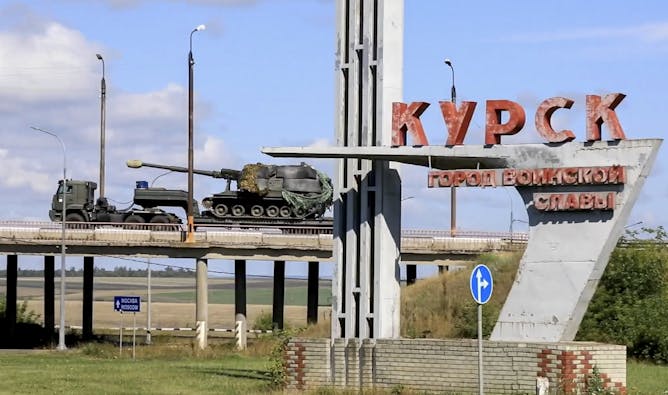|
Military incursions into Russia tend not to end well, history suggests. Which makes the Ukrainian advance into Kursk Oblast all the more astonishing – it is the first breaching of the Russian border by an enemy army since World War II.
It is still, of course, early days. But as Patrick Bury, a former British Army captain and warfare specialist at University of Bath, notes, so far the Ukrainian soldiers have been successful – managing to venture some 30 km into Russian territory with relative ease. Bury explains that good intelligence and pinpointing a weakly defended part of the Russian border were key.
And no matter what happens next, “one thing neither side will forget is how easy it was for Ukraine to roll over the weakly protected Russian border and embarrass Russian President Vladimir Putin,” writes Bury. As to how this is all going down in Moscow, Peter Rutland of Wesleyan University in the U.S. suggests that the Ukrainian advance represents a huge challenge to the Kremlin’s narrative on how the war is going.
Elsewhere this week, we’ve been wondering about another astonishing advance, this time’s Stonehenge’s massive Altar Stone which seemingly made its way 700 km from Scotland to Salisbury Plain.
|

Patrick Bury, University of Bath
Ukraine has captured hundreds of square kilometres of Russia in a well-planned surprise attack.
|

Nicholas Pearce, Aberystwyth University; Richard Bevins, Aberystwyth University; Rob Ixer, UCL
This is the longest known journey for any stone used in a Neolithic monument.
|

Dudley L. Poston Jr., Texas A&M University
By 2100, China’s population will likely be half its current size. It will also be a lot older, with fewer working-age men and women.
|

Jeffrey Andrew Weinstock, Central Michigan University
Despite feeling some schadenfreude at watching politicians squirm over being derided as such, a scholar of speculative fiction wants to keep America weird.
|
|
|
-
Petra Alderman, University of Birmingham
It’s déjà vu in Thailand as the country faces a familiar political crisis.
-
Wolfgang Preiser, Stellenbosch University; Cheryl Baxter, Stellenbosch University; Jean Nachega, Stellenbosch University
The global health system needs to wake up to the reality that an outbreak in one part of the world is a concern for everyone.
-
Thomas Gift, UCL
There are five key storylines that are likely to influence voters at the upcoming presidential election in November.
-
Emily Klancher Merchant, University of California, Davis; Win Brown, University of Washington
Many countries are enacting measures to counter population decline, but manipulating fertility is an inefficient means of solving social, economic and environmental problems.
-
Craig Mark, Hosei University
The scandal-plagued prime minister could not overcome his dire approval ratings.
-
Peter Rutland, Wesleyan University
The Kremlin has pushed a dual narrative: that the conflict represents an existential battle with the West, but that life goes on as normal for most Russians.
|
|